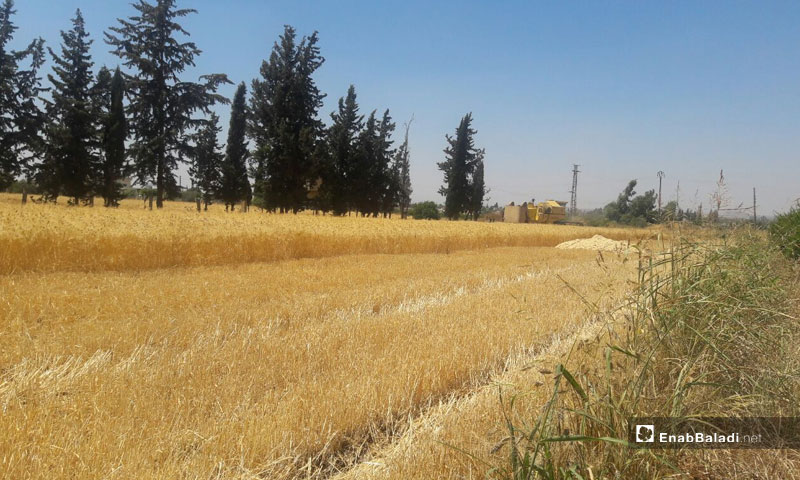



Wheat farmers in Daraa are going through a harvest crisis this year, for the abundance of crops has increased pressure on automated harvesters, which had not been able to perform their task at the pace required for preventing the risks of fire and pests, threatening the fat of the land.
In 2019, above-average rainfall led to bumper crops, especially of rainfed crops in the eastern countryside of Daraa, which reach maturity ahead of the irrigated crops.
In a statement to Syrian News Channel on July 11, 2019, the Director of Seeds Multiplication Office, Ghazi Nassif, said that the quantities delivered to the “Seeds Multiplication Office” in Daraa province amounted to 3130 tons. Besides, the manager of the silos in Izraa town, Saeed al- Zu’bi told the channel that 24,000 tons had been received by then.
An agricultural engineer (preferred not to mention his name), speaking to Enab Baladi, said that the per dunum production rate was 3000 kg for rainfed land and 400 kg for irrigated land. The land productivity varied according to farmers’ care, manifested in the use of required fertilizers and pesticides.
Pressure on harvesters
Automated harvesters are still fully operating, but a large portion of wheat crops are not harvested yet, especially in the western and northern areas of Daraa governorate, due to the high productivity of crops.
The harvest season in June and July is considered a period of intensive work for harvesters, which remain inactive up to the following season. Although the owners of harvesters cared attentively to keep harvesters in a good technical condition, the harvest delay occurred as a result of the discrepancy between the number of harvesters available and crops abundance.
Abu Malek, the owner of a wheat harvester in Daraa, attributes the harvest delay to the fact that the crops of irrigated areas in the western and northern countrysides of Daraa and al-Jaidor district were not ripe on time, but they took much longer owing to unusual climatic changes.
He added to Enab Baladi that the harvesters are continuously working and are equipped to face any possible breakdowns while the crews running them are ready to provide any needed spare parts to avoid further delays.
Low costs; high risks
The heavy rainfall this year saved the farmers production costs, for they were capable of dispensing with crop irrigation, being the most costly act that land cultivation incorporates, taking into consideration the rising prices of fuel used for operating the pumps and machinery.
However, high humidity and excessive rainfall caused the spread of fungal diseases while the warm weather and the absence of frost had led to insect infestation and the spread of field mice.
The farmers managed to eliminate these pests by spraying the crop regularly and the cost was generally low compared to previous years, according to the farmer Na’im Talib, who told Enab Baladi about his fear of fires.
This year’s rising temperatures and abundance of vegetation have led to the spread of fires in several areas of Syria. The fires have ravaged large swathes of wheat, from which Daraa governorate was not excluded, to lose more than 1,000 dunums of its wheat.
Talib said that some farmers had to manually harvest the crops, which resulted in crop and effort waste, as well as more costs, as a consequence to the few numbers of harvesters, for the available ones are running nonstop, not to mention the high wages of their operation, which amounts to six thousand Syrian Pounds per dunum.
Awareness-raising campaigns on fire hazards proliferated, warning farmers of the risks of cigarette butts and starting fires, urging them to guard their crop yields and harvest them as quickly as possible.
if you think the article contain wrong information or you have additional details Send Correction